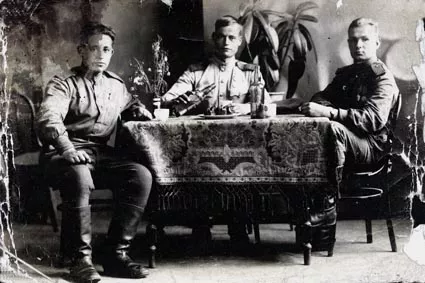This photograph taken in 1946 in Konigsberg. After that I was sent to the Far East (to Port Arthur). Here I’ll tell you about my life there and my way back to Leningrad.
By January 13, 1945 we approached the border of Eastern Prussia and passed to the offensive. We quickly went through 3 lines of German entrenchments, but on the 4th one a mortar shell exploded and I was wounded in the leg. I fell down into entrenchment. The wound was not terrible: the bullet missed the bone. I spent 17 days in the front hospital and again got back to my platoon. We participated in the storm of Kongsberg.
We burnt enemies out from houses, pillboxes and fortifications. Now I realize that those days were terrible, because we felt the near end of the war and were keen to meet the victory alive. In April we liberated Konigsberg and stopped: we did not move farther, because the war was coming to its end.
But for me the war was not finished, because the war with Japan began. In June they sent us to the Far East by trains. We got off in Chita and went at the march through Mongolia. It was extremely hot there (about 30 degrees centigrade), our way ran through sands. Because of the hot weather, we moved only at nights. They drew a rope between the endmen to prevent soldiers leave the column and be lost in the dark steppe or get under the tracks of tanks (tanks were moving along the roadsides).
So from Chita we moved through Mongolia, through Great Khingan Mountains, reached Manchuria [China] and met the Japanese army. It appeared to be a great surprise for the Japanese; they began to surrender, and we captured Port Arthur [a port in China]. On September 4 Japan capitulated. I went on serving as a soldier in Port Arthur. First I served in the regiment, then in the commandant's platoon (the commander's guard). Later the commander made me his personal driver. In 1948 he gave me leave of absence and I went to Leningrad, but came back. I served there till 1950 and at last I received my demobilization documents … but at that time a war between Northern and Southern Korea burst out. We had to convoy tanks for Northern Korea. We reached the place, handed tanks over to the local military and moved to Vladivostok [the USSR port on Pacific Ocean] by a warship. From Vladivostok I moved home. So in fact my service ended only in 1950.
I returned to our apartment near Fontanka River, which remained safe. Mom came back from evacuation in the beginning of 1945. It was possible for the citizens to return to Leningrad only if they had a document that your former living space remained safe. Her brother sent her an invitation and the document, therefore she returned to Leningrad together with my brothers. I saw Leningrad not right after the war, but only in 1948 (being on leave); therefore I do not remember ruins or other effects of war. By 1948 Leningrad was already repaired (for the most part) and put in order.















